
Eye Tracking in 2016: How Searchers Interact with Mobile SERPs vs. Desktop
In 2014, Mediative released an eye-tracking study that looked at how Google’s Search Engine Results Page (SERP) has changed over the last decade, and how searcher behavior has adapted as a result. We learned that:
1. Top organic results are no longer always in the top-left corner, so users look elsewhere to find them.
2. Mobile devices have habitually conditioned searchers to scan vertically more than horizontally. Searchers are looking for the fastest path to the desired content.
3. People are viewing more search results listings during a single session and spending less time viewing each one.
4. Businesses that are positioned lower on the SERP (especially positions 2–4) see more click activity than they did several years ago, making this real estate much more valuable.
5. The #1 organic listing still captures the most click activity (32.8%), regardless of what new elements are presented.
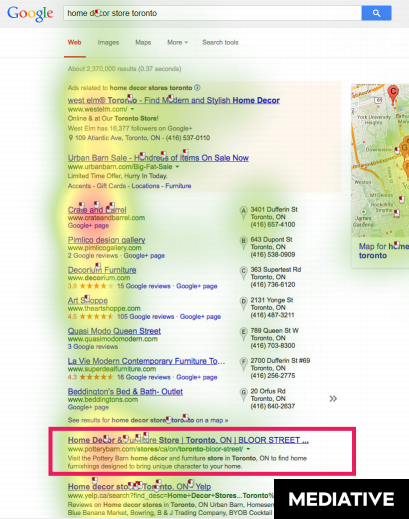
On a desktop, the #1 organic listing is shifting further down the page, opening up the top of the page with more potential areas for businesses to achieve visibility.
The way website listings are presented on a mobile search engine results page is significantly different from how they're presented on a desktop. The decrease in available screen size means there are a limited number of listings immediately visible to searchers, and competition for the top spots can be fierce.
In this latest eye-tracking study, Mediative took 49 participants of mixed age and gender, asking them to complete 41 search tasks on an iPhone 5 using Google. We used the X2-60 Tobii mobile device eye tracker to track where they looked on the screen, measuring time to first look, how many participants looked, and how many participants clicked on each listing.

The Tobii X2-60
An example of one of the tasks we asked? "You’re interested in taking a vacation to New Orleans. Use Google to find cheap flights from Toronto to New Orleans." Participants were shown the mobile SERP below:
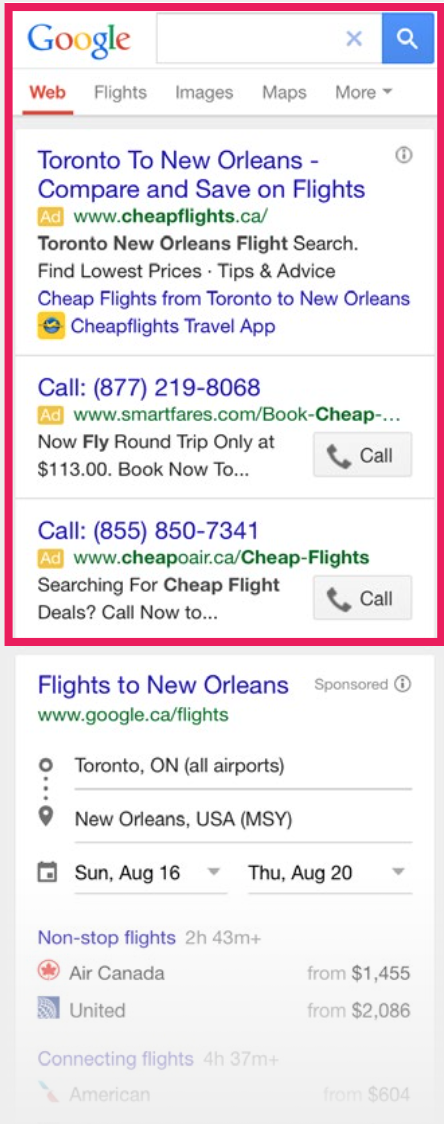
The area highlighted in the image above shows what's viewable on the mobile screen, before scrolling is necessary.
Ultimately, we wanted to know:
1. Where on the mobile SERP do searchers look and click the most? How does this differ from desktop searchers?
2. How important is the location of a listing on the SERP to win views and clicks from searchers?
3. Does the need for scrolling negatively or positively impact the views and clicks that listings further down the page receive?
4. What can advertisers do to ensure their Google listings are seen and clicked on a mobile SERP?
Key findings:
1. The #1 organic listing still captures the most click activity; it just takes 87% longer for it to be first seen on a mobile compared to a desktop.
In cases such as the one shown below, the knowledge panel that appears to the right of the results on a desktop (left image) becomes a key feature at the top of the mobile SERP (right image). Searchers have to scroll in order to see the organic listings that can be seen without scrolling on a desktop. This didn’t deter searchers from seeking out the top organic listing, however — it just took longer.
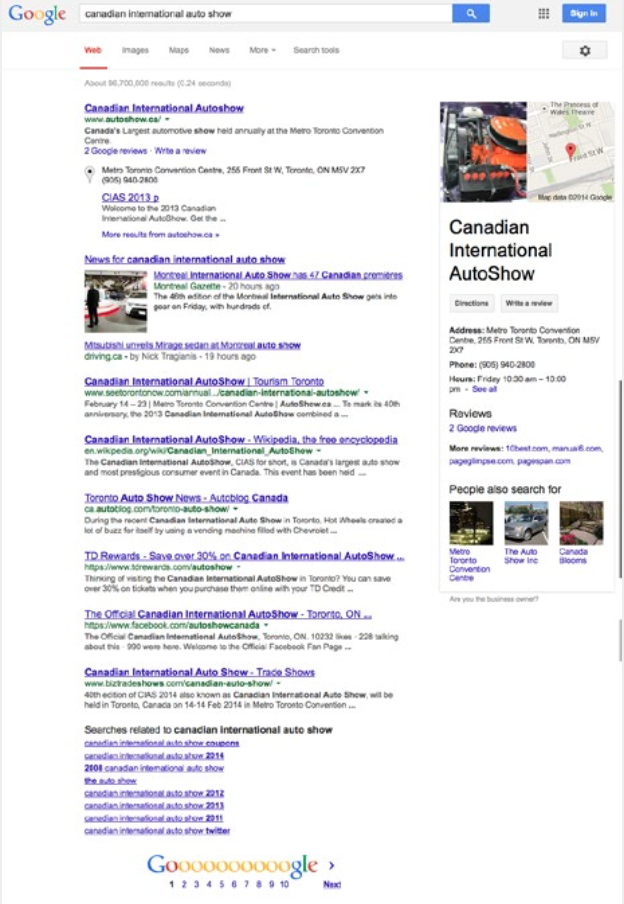
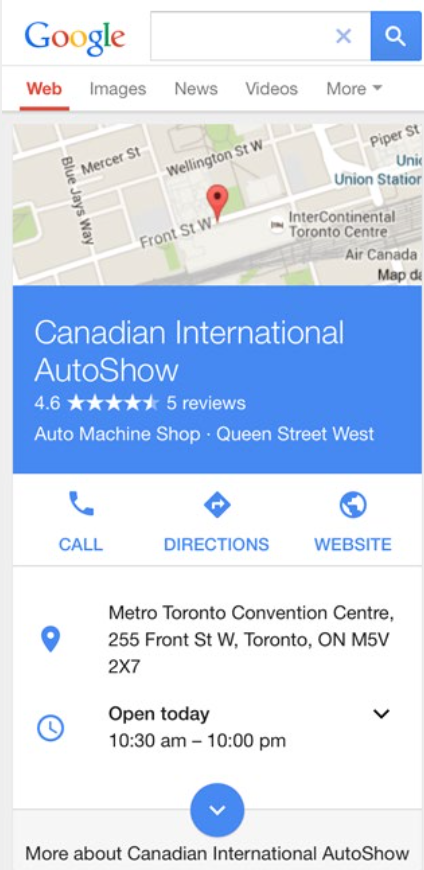
Takeaway:
The relevancy of your listing to the searcher's intent becomes more important than ever as it’s taking longer for people to first lay eyes on the organic listing. This provides more of an opportunity for them to be distracted by other brands and features on the SERP that appear before the organic listings.
2. Only 7.4% of clicks were below the 4th organic listing versus 16% on a desktop, and only 62.9% of tasks resulted in a scroll-down.
Takeaway:
Being above the 4th organic listing — whether in an organic, local, knowledge graph, paid position, etc — is critical. Fewer and fewer clicks are going to listings below the top 4 organic listings, leaving less opportunity for advertisers to drive traffic to their sites.
Mobile SEO needs to be taken extremely seriously. However, many businesses don't realize the importance of optimizing their sites specifically for mobile, resulting in ranking lower on a mobile than on a desktop.
- Invest in putting as much relevant content into your SERP listing and use available tools such as Schema to ensure that your listing stands out on the screen, increasing the likelihood of capturing clicks.
- Take advantage of the fact that other elements are presented above the organic listings, where over 35% of the page clicks on mobile were won.
- Track mobile rankings separately so as to optimize specifically for mobile, depending on the results that are seen.
Tips to rank higher in the mobile SERPs:
- If you have an app, ensure it's indexed. More and more, apps are going to be competing with websites for rankings and traffic.
- Remember you're dealing with a reduced space, so ensure your most important information is at the very beginning of page titles and descriptions, including priority keywords in the body of the website content.
- Websites with Accelerated Mobile Pages (AMP) might result in higher rankings. Although not confirmed by Google, the company did reiterate the importance of page speed and the need to improve page load times, of which AMP is one way to achieve this.
3. 11% more clicks went to the knowledge graph on a mobile phone compared to a desktop, and almost 22% less clicks went to the top #1 organic listing on a mobile compared to a desktop.
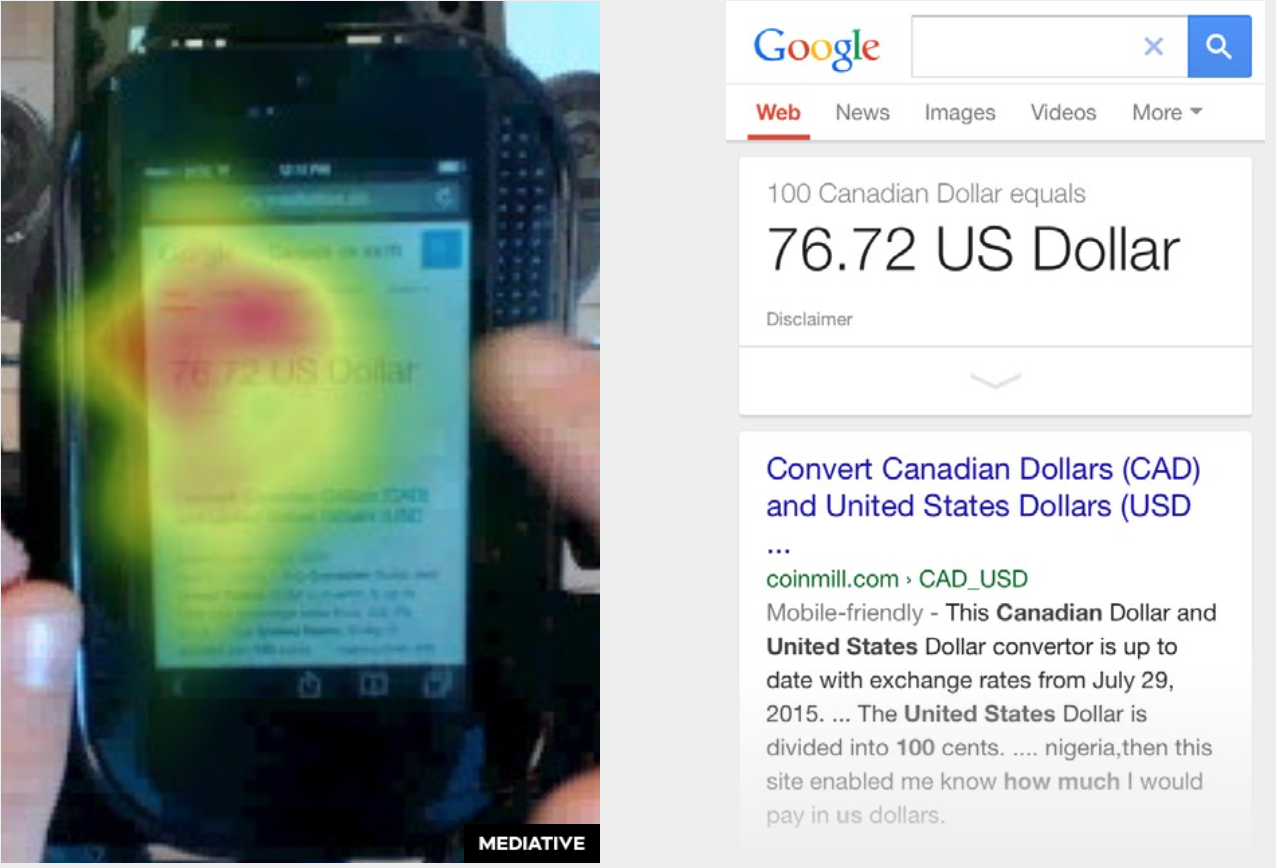
A heat map showing the views captured by a knowledge graph result on a mobile phone. The displayed knowledge graph is shown to the right.
The introduction of more elements at the top of the page requires significant scrolling before the lower organic listings are reached, and these additional elements took a portion of clicks away from the top organic listings in that time.
When we studied mobile SERPS that only included organic listings, we found that:
- 99% of people looked at the top organic listing vs. 83% on a desktop
- 40% of page clicks were to the top organic listing vs. 34% on a desktop
- 75% of page clicks were to the top 4 organic listings vs. 60% on a desktop
When we studied mobile SERPS that also included paid listings, local listings, a knowledge graph, etc, we found that:
- 78.5% of people looked at the top organic listing vs. 99% on organic-only pages
- 33.2% of page clicks were to the top organic listing vs. 40% on organic-only pages
- 57% of page clicks were to the top 4 organic listings vs. 75% on organic-only pages
Takeaway:
Features on the mobile SERP such as the knowledge graph results have the potential to capture a significant amount of attention away from the organic listings. The major difference between a knowledge graph on a desktop versus a mobile phone is that scrolling is required on a phone to see organic listings. Once again, the importance of a strong mobile SEO strategy cannot be understated. If you find your organic listing is losing too many clicks to the knowledge graph, find other keywords that don't produce the knowledge graph and include them in your optimization strategy.
4. The top sponsored ad is seen by 91% of searchers.
Takeaway:
Mobile screen real estate is extremely valuable. You have two ways to try and earn as much of that real estate as you can: paid search and mobile SEO. Although paid search can't guarantee that you'll always appear at the top of the results, a good paid search campaign can definitely help capture more clicks.
Consider paid text ads if you’re looking to improve website traffic, or optimize for local searches if appropriate, rather than focusing all efforts on ranking #1 in the organic listings. As three paid ads on mobile become more common, brands must be prepared to see a drop in traffic from organic listings, and perhaps consider increasing their investments in paid search.
5. 19.2% of page clicks on average went to the top 2 sponsored text ads, compared to 14.5% on a desktop.
Takeaway:
Paid search represents a bigger opportunity for traffic to your site on a mobile compared to desktop, especially if ad extensions are present.
Tips for using paid search ad extensions to push organic listings from view:
- Location extensions ensure the business address is shown alongside the ad.
- Call extensions add the ability to call the business directly from the paid ad.
- App extensions show a link below the ad text that allows people to download your app
- Site link extensions add links to various website pages from within the ad.
- Call-out extensions add descriptive text to your ad to describe more about what you do or offer.
6. 47% more clicks went to the map and local listings when they were above the organic listings.
Takeaway:
The positioning of the local listings, whether below or above the organic listings, can have a significant impact on the views and clicks captured by each of the local listings or the organic listings. With only three local listings appearing on mobile, it’s important for your business to be there, especially if your website is struggling to rank in the top 4 organic listings.
Tips to rank in the local listings and capture more clicks:
- Have a complete and accurate Google+ page for every location. Focus on the number of citations and NAP accuracy across third-party sites and local directories.
- Get reviews! The stars in the listing only appear once 5 reviews have been generated
- Ensure your site is full of locally relevant, useful content, with plenty of local keywords used throughout
Measure more than just clicks. Clicks to a local listing from a mobile device can result in a reduction in traffic to the brand's website, as the local listings link to the Local Finder. It's therefore important to measure impression data from local listings as well as traffic to business Google+ pages, as this can contribute to driving traffic to local stores and businesses.
To conclude
There’s no doubt about it: being listed at the top of the SERP is critical on a mobile device. People may scroll up and down, but ultimately, with over 92% of clicks going to an area above the 4th organic listing, if your business listing is below that, you’re almost invisible on a mobile search. Mobile must be taken seriously, but there are still far too many businesses that don't see that importance and are still focusing all their efforts on desktop.
Customer support service by UserEcho

